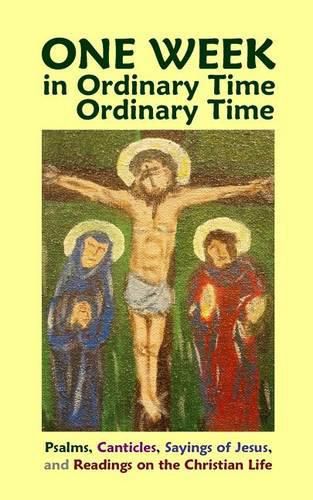Readings Newsletter
Become a Readings Member to make your shopping experience even easier.
Sign in or sign up for free!
You’re not far away from qualifying for FREE standard shipping within Australia
You’ve qualified for FREE standard shipping within Australia
The cart is loading…






One Week in Ordinary Time is a meditation rendering of Psalms (146 of the 150), Canticles (40), Sayings of Jesus, Scripture Readings on the Christian Life (42), and traditional songs from the public domain (46), arranged for offices of Readings, Prophets, Morning Prayer, Daytime, Evening Prayer, and Night Prayer. Almost all of the Psalms and Canticles and Readings are placed on the same day of the week as in the four-week traditional cycle of the Liturgy of the Hours. Designed by a parish priest as a straightforward introduction to praying the Liturgy of the Hours, One Week can also be used for private prayer and meditation by veterans of the breviary who wish now and then to pray the full Psalter in one week. This meditation rendering follows consciously these four choices: 1. For the name YHVH, or Yahweh, the Hebrew word Adonai (ah-duh-nih’) meaning My Lord, is used. In several places the words El or Elyon or Elohim are retrieved, as is Sabaoth instead of Mighty or Hosts. 2. Following the Christian understanding of one God in the three persons of the Trinity, masculine pronouns for God are avoided, except when God is referred to as Father, or specific references to Jesus. 3. In an admittedly imperfect effort to pray the gospel as well as the psalms, the word enemy is most often rendered as enmity. 4. Where people are referred to as evil, the emphasis is shifted to those who do evil, or ways that are evil or bad. There are problems with all four of these choices, and these would be reasons to not consider this compilation for public liturgy. Most of the antiphons are Sayings of Jesus drawn from Sunday Gospel readings: In the Sunday Lectionary, the Old Testament readings have connections with the Gospel reading, and the responsorial psalm is a response to the Old Testament reading. This means that on any given Sunday there is a relationship between the Gospel reading and the Psalm. The antiphons were chosen based on this relationship. Stephen Joseph Wolf is a parish priest in Clarksville, Tennessee, who spends most Mondays in silence and solitude writing for faith sharing groups. Visit www.idjc.org.
$9.00 standard shipping within Australia
FREE standard shipping within Australia for orders over $100.00
Express & International shipping calculated at checkout
One Week in Ordinary Time is a meditation rendering of Psalms (146 of the 150), Canticles (40), Sayings of Jesus, Scripture Readings on the Christian Life (42), and traditional songs from the public domain (46), arranged for offices of Readings, Prophets, Morning Prayer, Daytime, Evening Prayer, and Night Prayer. Almost all of the Psalms and Canticles and Readings are placed on the same day of the week as in the four-week traditional cycle of the Liturgy of the Hours. Designed by a parish priest as a straightforward introduction to praying the Liturgy of the Hours, One Week can also be used for private prayer and meditation by veterans of the breviary who wish now and then to pray the full Psalter in one week. This meditation rendering follows consciously these four choices: 1. For the name YHVH, or Yahweh, the Hebrew word Adonai (ah-duh-nih’) meaning My Lord, is used. In several places the words El or Elyon or Elohim are retrieved, as is Sabaoth instead of Mighty or Hosts. 2. Following the Christian understanding of one God in the three persons of the Trinity, masculine pronouns for God are avoided, except when God is referred to as Father, or specific references to Jesus. 3. In an admittedly imperfect effort to pray the gospel as well as the psalms, the word enemy is most often rendered as enmity. 4. Where people are referred to as evil, the emphasis is shifted to those who do evil, or ways that are evil or bad. There are problems with all four of these choices, and these would be reasons to not consider this compilation for public liturgy. Most of the antiphons are Sayings of Jesus drawn from Sunday Gospel readings: In the Sunday Lectionary, the Old Testament readings have connections with the Gospel reading, and the responsorial psalm is a response to the Old Testament reading. This means that on any given Sunday there is a relationship between the Gospel reading and the Psalm. The antiphons were chosen based on this relationship. Stephen Joseph Wolf is a parish priest in Clarksville, Tennessee, who spends most Mondays in silence and solitude writing for faith sharing groups. Visit www.idjc.org.